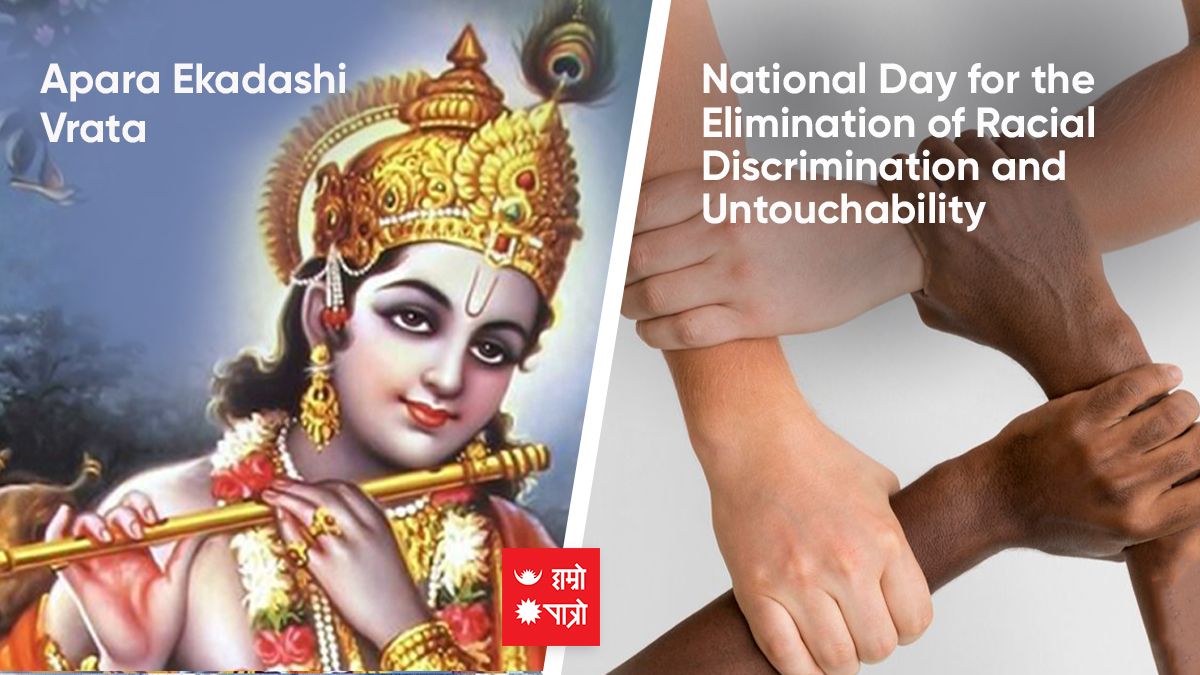
Apara Ekadashi Vrata (vaishnav)
What is Smarta and Vaishnava Dhar?
Smarta
Smarta means householders who worship Hari, Shiva, Shakti, Ganesha and Surya, they do not attach much importance to the rising tithi. All householders who celebrate Janmashtami, Ramnavami, Ekadashi in conjunction with the previous tithi are called Smartas.
"vaishnava"
Those who believe only in Vasudeva, Shri Krishna or Lord Vishnu are called Vaishnavas and all ascetics and sanyasis who hold a Guru also come under the category of Vaishnavas.In the Vaishnava sect, Udaya Tithi has great importance as Ekadashi is celebrated along with Dwadashi.
Meaning of Vaishnava Ekadashi
When Ekadashi is reflected at the time of local sunrise, it is called Smarta Ekadashi. Vaishnava or Bhagavata Ekadashi occurs when the dashami tithi of any aspect ends on the day of Arunodaya i.e. when the day of Ekadashi ends two hours before sunrise.That is, Smart Ekadashi ends 96 minutes before sunrise on Ekadashi day. Generally, Vaishnava Ekadashi falls on the day after Smarta Ekadashi.
Apara Ekadashi Wrata
Meaning of "APARA"
Apara means limitless, by observing the fast of this Ekadashi, people are believed to achieve unlimited and evergreen health and spirit.
Apara Ekadashi
It is believed that by observing Apara Ekadashi vrat all the sins of the person will be washed away. This Ekadashi is also popular by the name of ‘Achla Ekadashi’ and gives divine and auspicious results. Like all Ekadashi, the Apara Ekadashi is also dedicated to worshipping Lord Vishnu.
Apara Ekadashi described by Lord Krishna
The glory of Apara Ekadashi has been described by Lord Krishna Himself in the Brahmanda Purana, the simple translation of which is presented in this holy Ekadashi today. One day Yudhisthira asks Janardhan. What is the Ekadashi of Krishna paksha in the month of Jeshta? Yudhisthira urges Krishna to give a comprehensive description of the glory of this Ekadashi and to summarize Hari's grace.Shri Krishna reveals with great respect and love, King, you have asked a good question, the answer to this question will benefit the entire human society.
Shri Krishna said that the poetic nectar, devotional context, and holy grace of this Ekadashi will bring welfare to the entire human world.Krishna ji added. O Rajan, this holy Ekadashi of the month of Jeshtha is Apara Ekadashi. Devotees who glorify by fasting on this Ekadashi will be famous all over the world. Even great sins like cow slaughter, killing of Brahmins, killing of fetuses, or adultery will be cut off by fasting and devotion, and penance on this Ekadashi.
The real meaning of Brahman is not related to any caste, religion, or creed, but we want to make everyone aware of the essence of being counted in the category of Brahman is because of their quest for knowledge and welfare. Shri Krishna commands.O Rajan, those people who give false information, conspire for untruth without supporting the truth, they are considered to be extremely sinful. Lord Krishna believes that those who misinterpret or read the Vedas, do not do their duty, deceive others, and do bad deeds are all great sinners.
Lord Krishna believes that all these great sinners can take refuge in Hari and devotion to this Ekadashi to atone for their sins. Those who do not fast on this day are forced to be born on earth again, this day is very important for divine integration.
What is done in Apara Ekadashi?
Tribikarma is worshiped on this day, there are few other dates more important than this Ekadashi for atonement and penance. Apaar means infinite or limitless, the name is used because of the glory and fruit of this Ekadashi. After waking up in the morning, bathing before sunrise, using basil leaves, lightening incense, and lamps (Diyo) to Lord Bishnu, visiting the temple of Lord Bishnu, hearing the Apara Ekadashi Mahatma from the mouthpiece of the speaker are the rituals of this day.
On this Ekadashi, it is advised not to consume food and use oil on the body, all these things have the same scientific significance. Remember that in Ekadashi Vrat, it is important to focus not only on food fasting but also on reducing negative thoughts and stress. The recitation of Bishnu Sahasranama is indispensable in Ekadashi, let this Ekadashi pass in the proximity of bhajan kirtan and purity as well as devotion.
National Day for the Elimination of Racial Discrimination and Untouchability
This day has been celebrated since 2068 BS in remembrance of the declaration of Nepal as an untouchability-free nation by the Parliament on 21 Jestha 2063 BS.
What was the Nepali legal system against untouchability before 2063 BS?
Fifty-nine years ago today, in 2020 BS, the then King Mahendra Bir Bikram Shah Dev had brought a law (Muluki Ain) against untouchability and discrimination, although due to the lack of effective implementation of the law, caste discrimination was still practiced.
What is meant by untouchability and discrimination?
Untouchability and discrimination are when a person does or is done based on customs, traditions, religion, culture, customs, origin, caste, caste, descent, community, profession, occupation, or physical condition.
What is the provision of the Constitution of Nepal 2072 against caste discrimination?
Article 24 of the Constitution of Nepal 2072 BS has ensured the right against untouchability and discrimination as a fundamental right. If found untouchable and discriminated against, there is a provision of imprisonment for 3 years or a fine of Rs. 1 thousand to 25 thousand. In addition, the National Dalit Commission has also been recognized as a constitutional body.
It is punishable for any individual, society, government, or group to discriminate against anyone based on caste and to infringe upon their dignity. Let's contemplate this notion as we interact with others.
-Suyog Dhakal
Liked by: